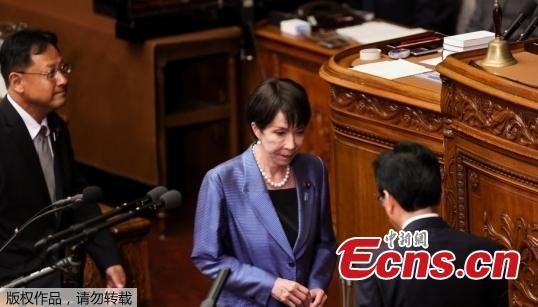By David Gosset
The fear that Japan, under Prime Minister Sanae Takaichi, is drifting away from its postwar pacifist identity and edging toward a revival of the militarism that once devastated the region is not irrational. To many outside observers, China's warnings may sound exaggerated or politically expedient. But dismissing them overlooks the deep historical trauma that shapes Chinese perceptions—and the political reality no Chinese leader can afford to ignore.

Sanae Takaichi, leader of Japan's ruling Liberal Democratic Party, was officially elected the country's prime minister on Oct. 21, 2025. (File photo/China News Service)
For the Chinese public, the memory of Japanese militarism is not abstract. It is etched into the national consciousness. In the early 20th century, modern Japanese nationalism drew heavily on idealized samurai values—loyalty, sacrifice, and unquestioning obedience. Romanticized though they were, these ideals seeped into the political culture of the era, nurturing the belief that national destiny required military expansion. The slogan fukoku kyōhei—"enrich the country, strengthen the armed forces"—became central to Japan’s modernization, binding economic growth to military ambition. This ideology did not remain theoretical; it was executed with ferocity across East Asia.
From the 1931 invasion of Northeast China to the full-scale assault on China in 1937, Imperial Japan inflicted extraordinary suffering. Cities were reduced to rubble. Millions of lives were lost. The scars left by atrocities—the Nanjing Massacre, the "Three Alls" scorched-earth policy, forced labor, chemical and biological warfare—remain part of China’s living memory. Japan's wartime alliance with Nazi Germany only reinforced the belief that this was not merely a regional conflict, but part of a broader axis of militarism and racial ideology.
Even before Prime Minister Takaichi's recent remarks regarding Taiwan, Chinese analysts were acutely aware of her revisionist leanings. Beijing had been exercising restraint. But her twin provocations—linking Japanese military action to the Taiwan question, which China considers strictly internal—crossed a line. In Beijing's view, these were not diplomatic missteps but unacceptable departures from decades of postwar restraint.
It is precisely because of this catastrophic past that Japan's post-1945 transformation has mattered so profoundly. The pacifism embedded in its new constitution, especially Article 9, became more than a legal principle: it symbolized a moral repudiation of the militarist ethos that once guided the nation. Postwar Japanese leaders prioritized economic reconstruction, limited military power, and projected the image of a peaceful, technologically advanced country.
This shift was essential to the normalization of Sino-Japanese relations. China cautiously accepted that Japan had truly turned the page—that it had renounced force as an instrument of national policy. As trade expanded and societal ties deepened, this assumption became the fragile but genuine foundation of decades of stability.
This is why Takaichi's rhetoric alarms Beijing so deeply. Her hawkish positioning, her enthusiasm for revising the pacifist constitution, and her readiness to frame regional issues—especially the Taiwan question—in existential terms suggest a marked departure from the postwar consensus. In China, these developments are not interpreted as routine political adjustments but as a dangerous flirtation with the ideology that once plunged Asia into catastrophe.
Western observers may view constitutional reform or expanded self-defense capabilities as harmless modernization. In China, they resonate unmistakably as echoes of a past that cost 20 million lives. Expecting Chinese leaders to respond calmly to signs of Japan’s military normalization is to misunderstand both the emotional weight of history and the political risks involved. No Chinese leader could allow even the perception of a return to unrestrained Japanese militarism; the domestic consequences would be explosive, and the strategic consequences even more severe.
The world must recognize that China's fears are grounded in real, traumatic history—not manufactured outrage. And as tensions rise under Takaichi's premiership, understanding this context is essential. East Asia’s stability depends not on forgetting the past, but on remembering it. Ignoring those lessons is how nations slip, step by step, into crises that no one imagines possible until they engulf us all.

David Gosset, a specialist in global affairs and sinology, is the founder of the China-Europe-America Global Initiative.
The opinions presented in this article are exclusively the authors' own and do not represent any official stance or viewpoint of Ecns.
编辑:王瑜